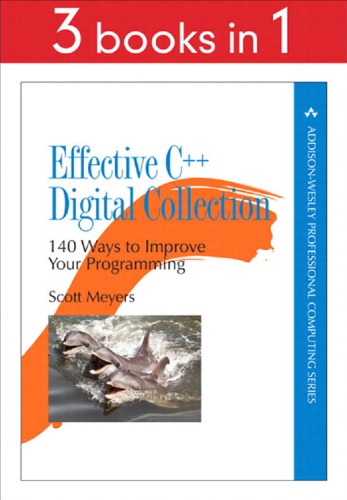Product desciption
Effective C Digital Collection 140 Ways To Improve Your Programming Meyers by Meyers, Scott 9780132979191, 0132979195 instant download after payment.
Scott Meyers's seminal C++ books-Effective C++,More Effective C++, andEffective STL-have been immensely helpful to hundreds of thousands of C++ programmers. All three are finally available together in this eBook collection.Effective C++has been embraced by hundreds of thousands of programmers worldwide. The reason is clear: Scott Meyers's practical approach to C++ describes the rules of thumb used by the experts to produce clear, correct, efficient code. The book is organized around 55 specific guidelines, each of which describes a way to write better C++. Each is backed by concrete examples. InMore Effective C++, Meyers presents 35 ways to improve your programs and designs. Drawing on years of experience, Meyers explains how to write software that is more effective: more efficient, more robust, more consistent, more portable, and more reusable. In short, how to write C++ software that's just plain better. InEffective STL, Meyers goes beyond describing what's in the STL to show you how to use it. Each of the book's 50 guidelines is backed by Meyers's legendary analysis and incisive examples, so you'll learn not only what to do, but also when to do it-and why. Together in this collection, these books include the following important features:
Expert guidance on the design of effective classes, functions, templates, and inheritance hierarchies.
Applications of new "TR1" standard library functionality, along with comparisons to existing standard library components.
Insights into differences between C++ and other languages (e.g., Java, C#, C) that help developers from those languages assimilate "the C++ way" of doing things.
Proven methods for improving program efficiency, including incisive examinations of the time/space costs of C++ language features
Comprehensive descriptions of advanced techniques used by C++ experts, including placement new, virtual constructors, smart pointers, reference counting, proxy classes, and double-dispatching
Examples of the profound impact of exception handling on the structure and behavior of C++ classes and functions
Practical treatments of new language features, including bool, mutable, explicit, namespaces, member templates, the Standard Template Library, and more. If your compilers don't yet support these features, Meyers shows you how to get the job done without them.
Advice on choosing among standard STL containers (like vector and list), nonstandard STL containers (like hash_set and hash_map), and non-STL containers (like bitset).
Techniques to maximize the efficiency of the STL and the programs that use it.
Insights into the behavior of iterators, function objects, and allocators, including things you should not do.
Guidance for the proper use of algorithms and member functions whose names are the same (e.g., find), but whose actions differ in subtle (but important) ways.
Discussions of potential portability problems, including straightforward ways to avoid them.


